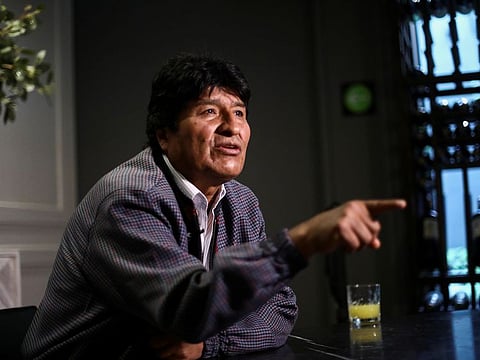Crisis in Bolivia fits no easy political narrative
How Evo Morales, longtime Bolivian president, lost control of the Latin American nation

The dramatic resignation of Bolivia’s former president Evo Morales and his flight to asylum in Mexico have turned into something of a Rorschach test on the hemisphere’s politics. Many on the left are convinced that Morales was unseated in a military coup, since an insurrection among the country’s police and armed forces compelled the long-ruling leader’s departure. In this view, his fate was that of a long, tragic line of Latin American left-wing populists betrayed by US-backed reactionary elements.
Meanwhile, observers and politicians further to the right hailed what is happening in Bolivia as a restoration of democracy and a victory against hegemonic socialism on the continent. Morales, in their view, was the next Nicolas Maduro, the Venezuelan demagogue bent on retaining power no matter the damage to his country and its fragile democracy. A popular Bolivian rebellion booted him out of office.
Neither version of events tells the whole story. For now, Bolivia is in a perilous state of political limbo, bitterly divided over the path forward with the all-too-real prospect of fresh clashes between backers and opponents of Morales. Jeanine Anez, a right-wing opposition senator, proclaimed herself the country’s interim leader, a role to which she was constitutionally entitled after Morales and key allies resigned and left her — the deputy leader of the country’s Senate — next in line.
Anez has promised to hold new elections soon, though it’s unclear to what extent, if any, Morales and his party will participate.
‘Clear manipulation’
His Movement for Socialism party remains technically the largest faction in both chambers of Bolivia’s legislature. Footage on Wednesday appeared to show Adriana Salvatierra, the former president of the Bolivian Senate and a Morales ally, getting roughed up by security forces when she attempted to take her seat in the chamber after resigning over the weekend.
The crisis can still be justifiably laid at Morales’s feet. In power since 2006, he made the decision to ignore the outcome of a 2016 constitutional referendum that narrowly rejected his bid to abolish term limits.
Morales more closely followed an authoritarian playbook, undermining some of the social and indigenous movements that once buttressed his rule and prosecuting former allies who turned against him.Ishaan Tharoor
A ruling from a constitutional court packed with his loyalists allowed him to compete for a fourth term. But the first round of the presidential vote on October 20 was so plagued by irregularities that a later audit by the Organisation of American States — a continental bloc that is mistrusted by some on the left — concluded there were signs of “clear manipulation.” Weeks of mass protests against Morales culminated in the country’s police and army chiefs urging his resignation.
Morales had little choice but to comply, but in comments made in Mexico on Wednesday, he said he was determined to return home and urged a national dialogue to resolve the dispute. Morales’ supporters in Bolivia have refused to recognise the legitimacy of Anez’s ascension, raising fears of further social unrest after a month of strikes and protests. Their critics argue this could have all been avoidable.
Morales could have lifted up new leaders to take his place, but instead actively undermined any who might do so. He could have served out his third term, left office with a grand legacy, and even run again in five years if he wished (the term limits only apply to consecutive terms). But instead he was willing to plough through the basic rules of democracy to hold onto power, and the people knew it and in the end they rebelled as Bolivians so often have.
The Trump administration cheered the news and quickly recognised Anez as the country’s interim president. In a statement, President Donald Trump celebrated the developments in Bolivia and placed Morales alongside his other Latin American bogeymen. But unlike Maduro, Morales had not presided over desolation.
In recent years, though, Morales more closely followed an authoritarian playbook, undermining some of the social and indigenous movements that once buttressed his rule and prosecuting former allies who turned against him. Some pundits attempted to cast his defeat in sunny, global terms. The inspiring victory of the Bolivian people has great meaning far beyond Latin America.
Morales’s sudden loss of support should not only scare embattled leftist dictators, such as Maduro in Venezuela; it should also terrify far-right populists, such as Hungary’s [Viktor] Orban or Turkey’s Recep Tayyip Erdogan, who still appear to have a firm hold on power. That last suggestion from Mounk makes sense in the abstract but becomes more curious when you actually think about the particulars. Both Orban and Erdogan are ultranationalists who would find a degree of ideological kinship not with Morales, but those at the forefront of Morales’s ouster.
It is hard to grasp why Orban, a virulent Christian nationalist with a similar disregard for his country’s more downtrodden communities, would be perturbed by any of this.
Taking it all in from Mexico, Morales claimed he was the victim of “a racist and fascist coup.” Now, his country holds its breath at what may come.
— Washington Post
Ishaan Tharoor writes about foreign affairs for The Washington Post.
Sign up for the Daily Briefing
Get the latest news and updates straight to your inbox



